This article has links to products and services we love, which we may make commission from.
Is Cuba safe to travel? Yes, it is actually one of the safest countries in the world when measuring crime figures. However, years of financial oppression has resulted in the creation of crafty ways of making money, some aimed at tourists. While you may experience some of the following Cuba scams, they will be delivered with charm and while it can get annoying, just remember your position of privilege which allows you to visit Cuba. Let’s find out about the popular scams in Cuba so you can be cautious of them during your trip. Note: All of these scams happened to us or tourists we met during our vacation. We’re happy to talk and here to learn, please leave us a comment below.
» You make also like | First timer’s guide to Cuba travel
Cuba Travel Safety: Avoid These Scams in Cuba
I rarely say that tourists need to buy travel guides but Cuba is definitely a country you would benefit from having one. Check out the options below.
1. Fake Cigars in Cuba
One of the most popular souvenirs to take home Cuba has to be cigars.
However, not all cigars are created equally and fake cigars with no duty paid will be confiscated at customs.
Be wary of buying them on the street as the sealed box may contain banana leaves.
For the authentic cigars, buy from plantations or shops.
There is even a great difference in price between authentic Cuban cigars.
If you are budgeting, the finest Cuban cigars were cheaper (three times!) in the official shop in Viñales compared the official shop in Havana.
Viñales is a beautiful, lush town close to Havana. I highly recommend you spend at least a day there during your time in Cuba.
2. When Did You Arrive, Sir?
If you answer “today” expect the response to be along the lines of…
What a great day to arrive, it’s the national day of – whatever black market goods/service is being sold – at an overinflated price.
How To Avoid This Scam
Smile, give pleasantries and move on but don’t be afraid to ask if you need help with directions, finding casas particulares (renting a room in a local home, very common in Cuba) or a vintage car tour.
Financially, some Cubans work in groups.
One member of the group will source what you need and in return they receive some commission from the service owner.
For example, when we hired bikes in Trinidad, we found the bikes through asking a taxi driver who walked us to his friend’s house. From here, we set up the hire for the next day.
Out of curiosity, we asked the bike owner what the taxi driver got out of walking us to their house instead of pointing us in the right direction.
They explained the commission process which a clever way to make money while living in a country which has has been restricted by el bloqueo embargo.
It’s very similar to how bloggers make money.
We recommend services and products we love on our websites, newsletters and social media channels and when you click the affiliate link and purchase, we make a small amount of commission from company.
Another example of the referral process took place during our second visit to Havana.
When we arrived back in the city, instead of pre-booking accommodation, we asked a tuk-tuk driver to take us to a casa.
The first casa wasn’t available so he took us to another.
We agreed on a price with the casa owner and stayed for a few nights. The same casa also helped us sort a taxi to the airport.
Somewhere down the line, the tuk-tuk driver will receive a commission for the accommodation sale and the casa owner will get a commission for the taxi sale. Clever eh?
If you do not feel comfortable arriving without planned accommodation I recommend booking a hostel or hotel for the first two nights and then consider moving into a casa the third night.
Alternatively, book online before you arrive. Casas now advertise on Booking.com.
Just consider that apps like Airbnb don’t work when you are in Cuba so you won’t be able to contact your host through it.
Examples of casas:
- Casa Colonial La Terraza: Affordable casa, friendly family-run with 5/5 rating on TripAdvisor
- La Villa Teresa: This is an actual palace with a pool. Outstanding reviews on TripAdvisor
3. Jinetero Chat
We’ve met two clever guys who fell for this one as well as having it tried on us!
A jinetero (hustler) will join in your conversation and once you’ve chatted for a while they will ask you to help them out financially.
In our case we were asked to buy milk (leche).
According to the guys who went along with the scam and our tour guide who explained the process, the jinetero will take you to a shop and the milk will be pre-packaged in a bag ready to go.
Instead of the price of milk you will be charged $20-30.
Once you leave the shop, the milk is returned and the shopkeeper and the jinetero split their money.
This seems to be more popular in Havana than other Cuba destinations.
Just be aware and have your wits about you. As soon as you are being led into a shop take your sympathetic ear away and politely say sorry.
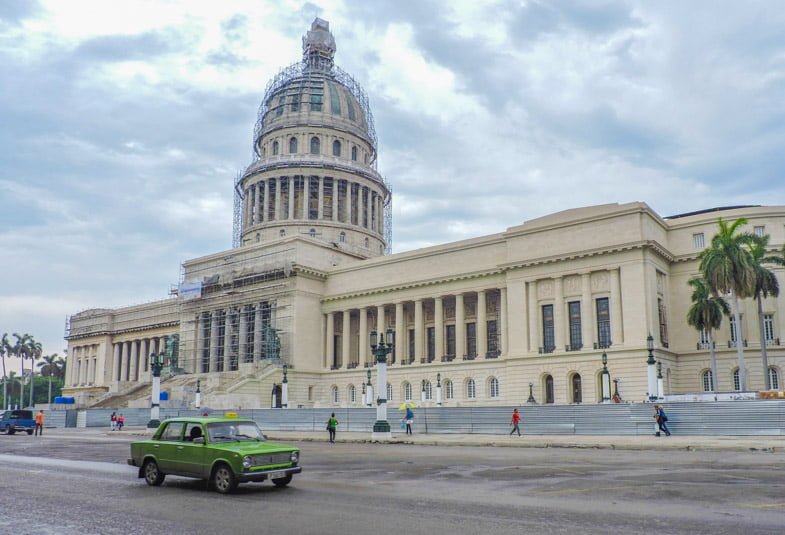
4. $6 Coffee
Coffee can be purchased for around 50 cents – $1 from the wee shop windows dotted around Havana.
However, some shops sell overpriced coffee to gringos.
Please don’t be surprised when a local kindly offers to buy it for you in local currency (CUP) at a fraction of the cost in exchange for a dollar.
If you are particularly gullible this scam will be extended.
Your new friend will now wander through the streets with you sharing friendly local knowledge.
Do expect a bill for a private tour at the end. This happened to a mature couple in Havana.
Unsure about Cuban money? Read our Cuban currency guide.
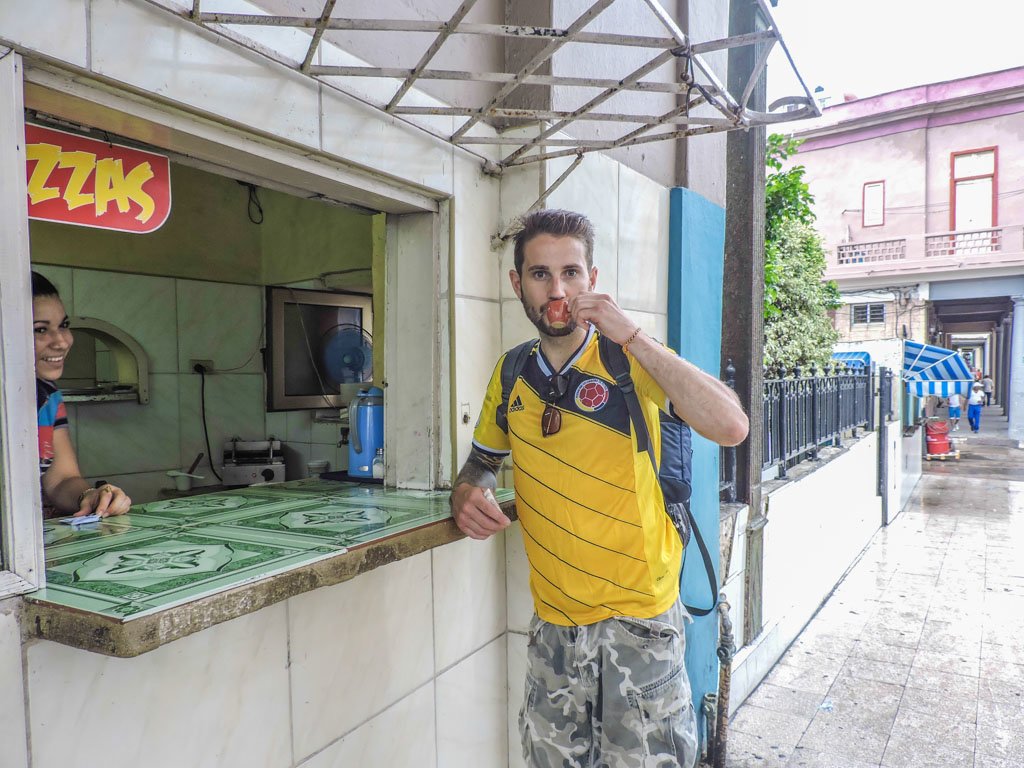
5. Food in Cuba
Food in Cuba is a hot potato topic for tourists. Some meals will be great, others will be OK.
We first tried Ropa Vieja in Trinidad and make it often at home in Scotland.
If staying in a casa you will have to eat out, unless your host offers to cook for you for an additional charge.
Like in many countries, PRs will try to encourage you into their restaurant.
When a PR approaches you, take what is on offer with a pinch of salt.
Once you are seated, the menu might look at a little different and drinks might not be inclusive of the price as promised.
We fell victim to this scam in Caleton (Bay of Pigs). It was a little annoying because my partner is a really fussy eater and since Caleton is tiny, choice was limited.
However, don’t let this put you off visiting the Bay of Pigs if plan to dive. You can read more about diving in Cuba here.
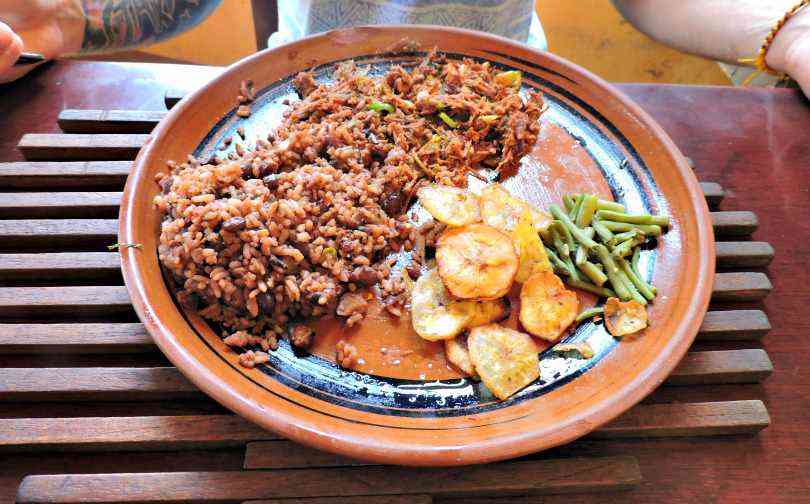
6. Casa Particular Prices
On average, Cuban government wages are $28 per month, some would say this wage is relative to local prices, others would say it’s not.
To bump up wages, many Cubans rent out second houses or extra rooms.
This is all above board. Official casas have a specific sign outside of their homes and they record your details for government records.
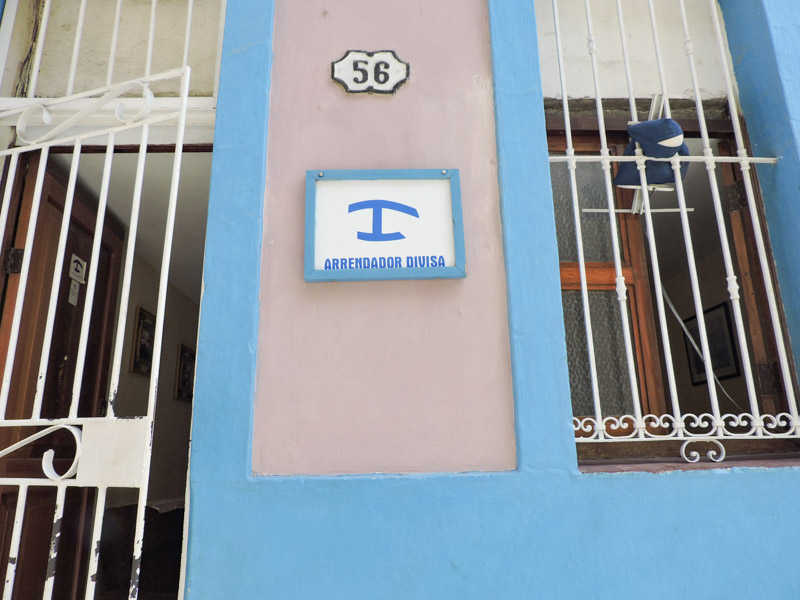
Staying in a casa is part of the Cuban vacation experience.
Guidebooks and websites recommend you budget $10-30 per night.
We never paid more than $10 per person (plus breakfast) after the first casa.
Be cautious of how much you pay for casas, there isn’t always that much difference between the properties.
You can read everything you need to know about casas particulares here.
Should you buy gifts for locals?
Good question and one we get asked often.
We didn’t and were never asked for any.
My good friend, Laura, did feel that there was more of an assumption that tourists would have gifts in the south of the island or possibly because she was part of an organised tour and not travelling independently?
If you do want to bring items, pack items they may actually need such as toiletries or toys for kids.
7. “Lo siento, no tengo cambio”
When paying street traders and some shops with notes, expect there to be little change.
You have two options here.
One, accept being short changed.
Two, listen out for “no tengo cambio” which means, I have no change.
Advise the shop keeper that you will go elsewhere if there is no change.
Learn the language!
We have survival Spanish but struggled, luckily for us we were travelling with a fluent Spanish speaker.
Purchase a phrasebook at the very least.
8. Buses in Cuba
There are two bus companies that travel throughout Cuba, Viazul and Conectando.
Viazul has a website where you can book seats making it more popular with tourists.
The journey times are also available on the site.
I suggest that you take a screenshot of the trips you intend to make because no one ever knows the times of the buses.
The reason for this is unclear.
It could be because regardless of schedules, buses run on ‘Cuba time’ anyway or possibly as casa owners would prefer you stay another night which is what they asked us to do in Caleton near Playa Larga at The Bay of Pigs.
Another reason could be because there are taxi colectivos which do the same route and by selling a ride, commission is made.
Taxi colectivos are shared car rides.
It is very common for tourists to hire collectivos to get between towns in Cuba.
You may also be asked to swap cars during long journeys so don’t be spooked if this happens!
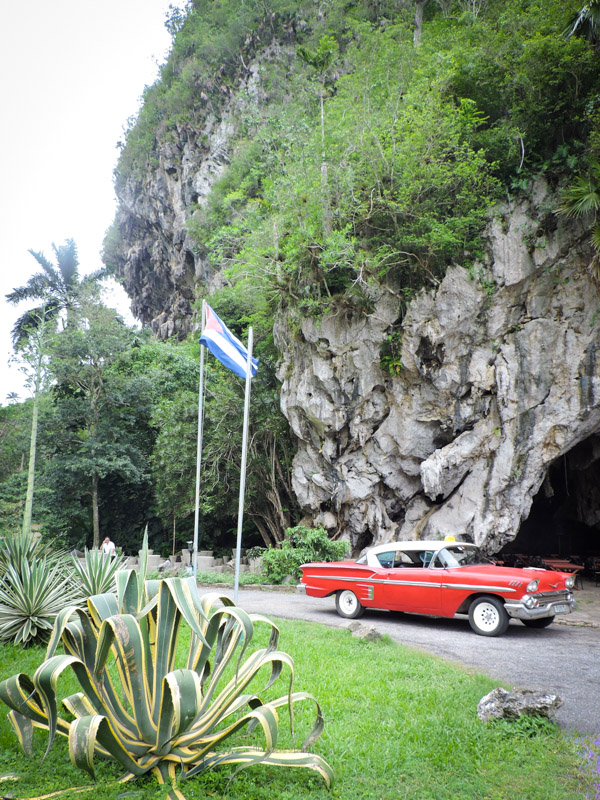
9. Holiday Romance in Cuba
It is not uncommon to see mature Western women with young Cuban men, salsa dancing in the night clubs of Cuba, specifically in Trinidad.
However, if you meet a local who picks you up in a cafe or while sightseeing and the police takes a keen interest in your date, it might be time to consider your options fast.
We met a young Irish high school teacher who set up a date with a waitress of the same age in Trinidad.
He became concerned when the cops were showing her as much interest as he was.
The police understood, only his pride was challenged.
However, in Havana, a huge group of us joined another traveller who was invited by a local to see a cool live band.
The best advice is to have your wits about you and read the situation.
The below image is a bronze sculpture by Cuban artist Roberto Fabelo called Fantastic Voyage.
According to our Havana tour guide, it symbolises all the young Cuban women who have sought another life with foreign men.
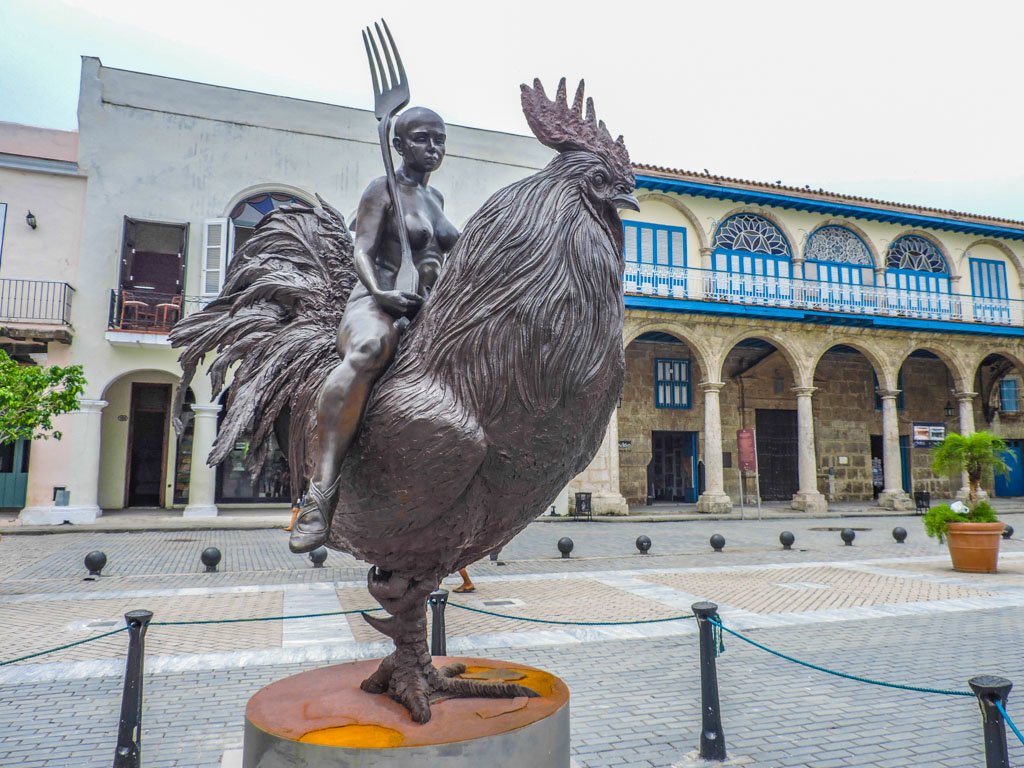
10. Shop Shut!
This scam is not unique to Cuba but we did experience a good attempt to get us into a bar and away from The Revolution Museum.
An older couple told us that it was their anniversary! Congratulations, we rejoiced.
After a bit of chat, they asked where we were going… Alas, the museum is closed today but you should check out this bar!
We said our goodbyes and turned a corner to an open museum. They get a commission when you step through the bar door.
This is a common scam in many countries, especially with taxi drivers advising you that hotels/hostels have closed down.
Final Words
Now we are not saying Havana is ‘scam city’ and I’ve definitely fell for worse during my travels, Istanbul note scam I’m looking at you!
Be equipped, avoid these tourist scams in Cuba and you’ll have a fun trip. Even if you do fall for any of them, it’s a story to remember.
Going to Cuba?
Pin to your Cuba Pinterest board!
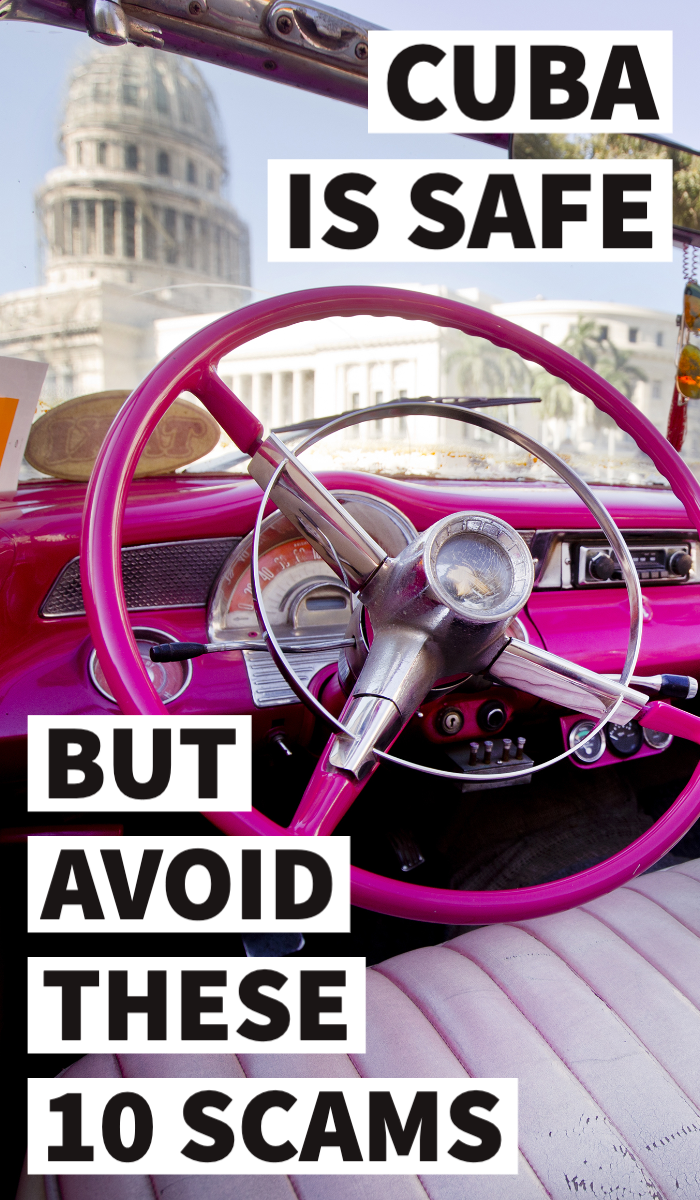
Any scams to add? Tell us in the comments below

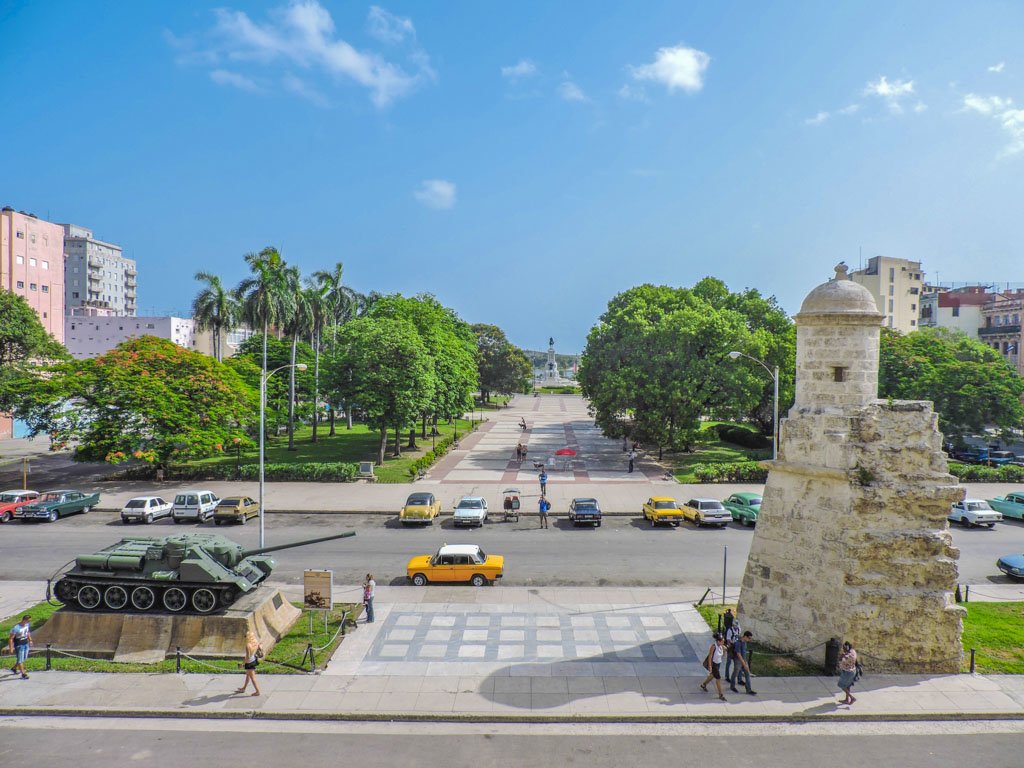
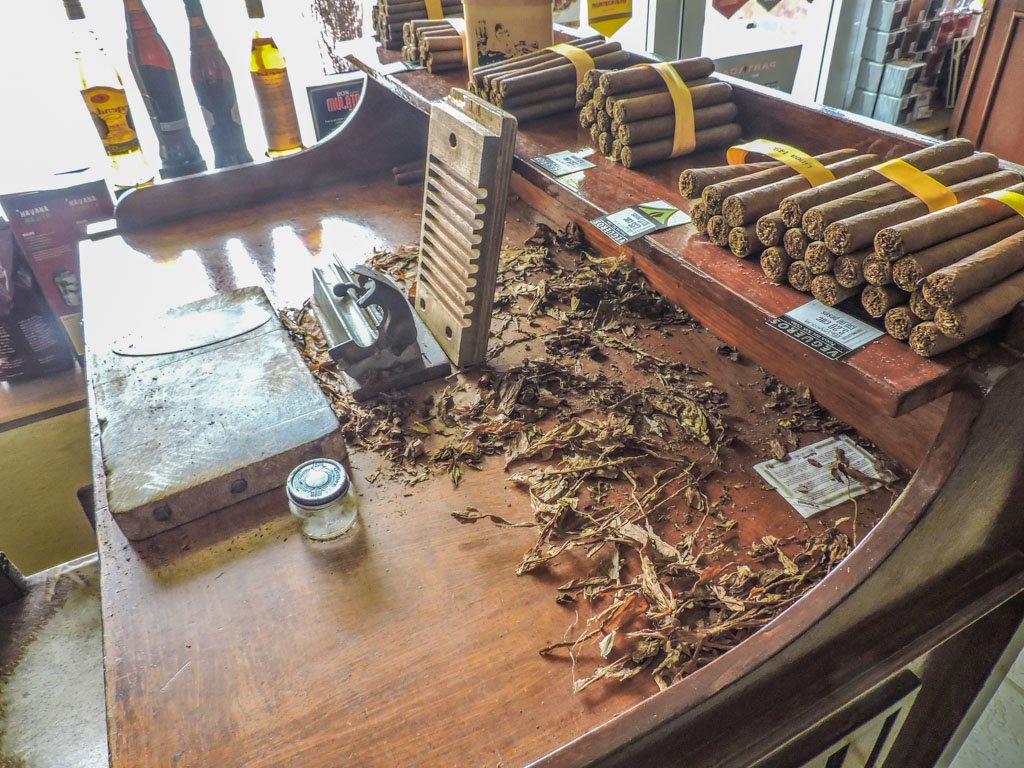
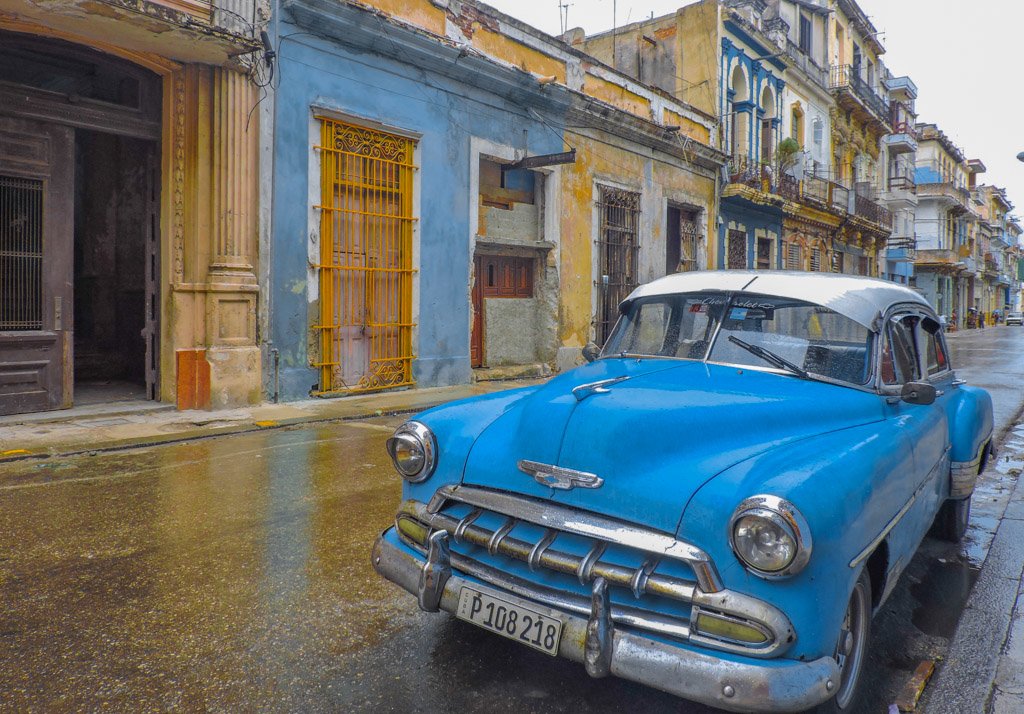
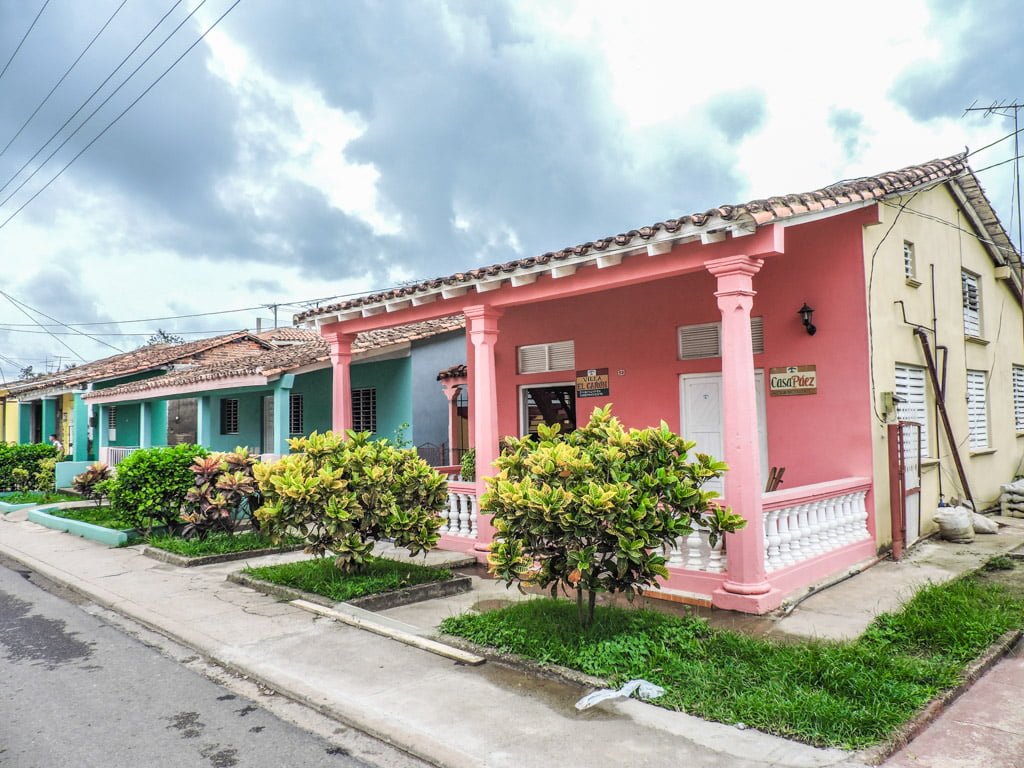
The cigar festival and salsa festival scams are so common. My husband and I were approached multiple times during our week in Havana. We were also followed by a guy after leaving our hotel on our first day in the city. About 15-20 minutes into our walk, I stopped to take some photos and this guy walked up to us and said, “Hi, I’m Roberto, your security guard at the Capri Hotel. I saw you in the lobby last night.” Then he went on to say that there was a cigar festival at a co-operative place a few blocks away and he offered to take us there. This was the first time we heard about the ‘cigar festival’ and we actually believed him, but we weren’t really interested in buying more cigars so we politely declined. It was only when we got to the city centre and more people started approaching us about the cigar festival that we started to get a bit suspicious. When we returned to the hotel later that day, we asked the security guard on duty if there was a Roberto working there, and surprise surprise, he didn’t exist.
However, we never really felt harassed or intimidated while we were in Havana. Once we said no, the scammers left us alone – they just wished us a good day and moved on!
Totally agree! That’s what I mean, you don’t feel unsafe but it is best being armed with the scams before you touchdown.
Oh, I’ve just realised that nobody else mentioned the salsa festival scam in this post. Many locals walked up to us, started a friendly conversation with the usual ‘Where are you from?’ and then told us that there’s a salsa festival not so far away. Thankfully, we never really got to find out what this ‘festival’ was really like, but I read later that they would normally take you to a salsa class in some dodgy place and then you’d have to pay for it.
We can go a step worse! An older gent we were socialising with ended up paying a female ‘friend’ money for educational classes. He said he didn’t care as it was part of the banter. Did you enjoy your trip anyway?
For those of you who dove in Cuba. We’re going at Christmas to Cienfuegos to dive with whale sharks, and then to snorkel with our kids. I cannot find prices anywhere and want to have enough money to cover everything. Any information on costs of renting snorkel gear for multiple days/diving costs in Cienfuegos over the Christmas-New Years break would be SO APPRECIATED!!!!
Hi Laura, sounds like a great trip. We went diving in Playa Larga – you can read more about it here.
Hi Gemma! Took me a while to get back to writing this. So what I can say about Havana is that it’s not an easy place to be in (the poverty), but that I also loved it and hope to return someday. The August heat was killer giving me a bad headache, nausea, and one evening I was concerned I might faint. I’ll never visit in the summer again, lol. The food was pretty bad except for one place and I was dying to get back to home and stuff my face there. Since I’m an American, I can’t use cards there so it was strange to have to carry around large wads of cash and hope I didn’t lose it. The CUC and CUP situation drove me bananas.
But about the scamming…there was almost none. The only time was at the Cadeca at the airport. I brought over 504 Canadian dollars instead. And the teller gave me a piece of paper with the exchange and saying I gave her 381 Canadian dollars. Wtf? I pointed out to her the amount I gave her. She handed the Canadian dollars back to me and told me to count it and I did it in front of her. So that was resolved. But that was the only time someone tried to scam me.
I should also point out that the folks down there could not pinpoint where I was from. So maybe that’s why they didn’t bother scamming me. I routinely was asked if I was Peruvian or Mexican, I’m ethnically Chinese but have medium-dark skin. Not exactly the stereotypical Gringa look. There was constant cat-calling but hey, that happens plenty in NYC too.
Unfortunate that it was exhausting for others but it was a smooth ride for me.
Great to hear back from you and, apart from the heat and food, you had a great trip! I never experienced the catcalling, most likely because I was with Craig but yes, experienced it in Nicaragua a lot and it drove me mad. Men holding their son’s hands to take them to school and thinking it was cool to shout ‘hey mammy’ at me while I walked to the gym. No thanks, pal!
??? Say it isn’t so! I hope it gets resolved soon! Thanks for the heads up Gemma!
Patchy – that’s the conclusion! Come back and share your experience, please 🙂
Hi! I’m leaving for Havana in a few days and want to thank you for writing this and encouraging others to share their experiences as well. I would’ve been naive to some of these schemes and it’s shocking to read one right after the other. It’s been many years since I’ve traveled and either I’ve been lucky in Panama and Ecuador or they just weren’t that scam-heavy. As an American, it would also suck to run out of money due to scamming and not have a debit/credit card that you can use as backup since they’re not accepted… so I do need to keep a close eye on my usage.
Sounds like there’s a few locals on here who are taking this post personally. To be frank, it took me a while to save for this trip that I’ve been dying to go to since the travel ban was lifted. I worked hard for it. I’d rather give because I wanted and chose to instead of be conned out of money. At the end of the day we need to survive too.
My sis said the trip doesn’t sound like fun: “too many rules and regulations (U.S.), scamming and bland food”. Could be, but despite that I’m thrilled to finally be out there for a few days.
I’m sure you will have a ball, Christine. Thank you for taking the time to read – please come back and let me know how you get on. Another reader has just informed me that WiFi is now down in Havana, I hope this is not true! Let me know.